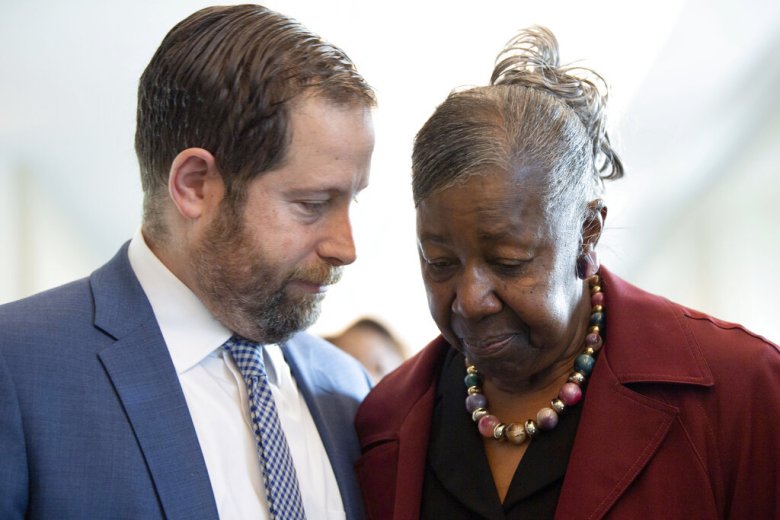
By AFRO Staff
Joyce Watkins spent 27 years of her life in prison after she was convicted of the rape and murder of a 4-year-old girl – her grand-niece. On Jan. 13, more than three decades after the nightmare began, Watkins was finally exonerated.
“I thank all the people for their prayers and helping me get out of this mess which has cost me half of my life for nothing” Watkins told the press as reported by CNN affiliate WZTV. “But, I’ll get over it.”
Joyce Watkins and Charlie Dunn were convicted in 1988 based on medical evidence at trial that has since been debunked, according to a Jan. 6 order by Davidson County Criminal Court Judge Angelita Blackshear Dalton. In addition, the trial prosecutor told the jury that Watkins had washed bedsheets in order to destroy evidence of rape, an assertion that was simply untrue, Dalton wrote.
Watkins and Dunn were sentenced to life for murder and 60 years for aggravated rape, with the two sentences to be served concurrently. Dunn died in prison in January 2015. His estate filed the petition to reopen his case on his behalf. Watkins was released on parole in October 2015 and has been subject to strict rules as a registered sex offender.
Dunn’s daughter, Jackie, was at the hearing on Jan. 13. “I wish my daddy was here to witness this day,” she said to CNN affiliate WTVF. “He knew he was innocent, he knew he did not commit those crimes.”
According to a Nov. 10 review of the case by the Nashville district attorney’s Conviction Review Unit, the child, who lived in Georgia, went to stay with a great aunt named Rose Williams in Fort Campbell, Kentucky, in the summer of 1987. It was originally supposed to be a two-week visit but it turned into two months. During that time, the child suffered a number of injuries and showed abnormal behaviors, including drinking from the toilet bowl and spontaneous vomiting at the dinner table. She did not want to sit down to take a bath and complained to Williams of pain in her vaginal area, according to the report. She lost consciousness twice.
At one point, an anonymous report to the Kentucky Department of Social Services claimed that the child was being physically abused. The social worker closed the case after Williams lied and said the child was already back in Georgia.
Watkins, who was also the child’s great aunt, went to visit them that summer and came back concerned about the child. She made repeated calls to the child’s mother, telling her she needed to go get her. The mother, in turn, wanted Watkins, who lived about an hour away in Nashville, to pick up the child. Later Williams began calling as well, insisting that Watkins come get the child. On June 26, 1987, Watkins and her boyfriend Dunn did drive up to get the child shortly before midnight after having worked the nightshift.
As soon as they returned to Nashville, Watkins noticed blood on the child’s underwear and called the child’s mother and grandmother. They told Watkins that they were coming to get the child and that she should not take the child to the hospital. When they had not arrived the next morning, Watkins took the child to the hospital anyway. She was suffering from head trauma and was determined to have been the victim of sexual assault. Shortly after her arrival, she was put on life support. She died the next day when life support was removed.
The girl had only been in the custody of Watkins and Dunn for nine hours, and they were not suspects in the beginning. Nashville detectives began looking at them after the military investigators in Fort Campbell decided that the child could not have been abused in Kentucky in an investigation that the Conviction Review Unit called “minimal at best.” It relied largely on statements from Williams that were taken as true despite her earlier lies to social services, according to the review.
In addition, the state medical examiner, who had initially said the child’s injuries occurred 24 to 48 hours before her death, changed her testimony 20 minutes before the trial, dating the injuries to no more than 12 to 14 hours before her death, when she was in the custody of Watkins and Dunn. The November review debunked the medical examiner’s method of dating the injuries and showed some of them must have occurred before the couple picked up the child.
The couple had always maintained their innocence, and after the review, Nashville District Attorney Glenn Funk’s office agreed, finding “clear and convincing evidence establishing Ms. Watkins and Mr. Dunn were convicted of crimes they did not commit.”
“Joyce Watkins and Charlie Dunn are innocent,” District Attorney Glenn Funk told CNN. “We cannot give Ms. Watkins or Mr. Dunn their lost years but we can restore their dignity; we can restore their names. Their innocence demands it.”
The Tennessee Innocence Project tool on Watkins’ case after she approached them and shared her story. Her attorney Jason Gichner expressed joy over the case’s outcome.
“It’s been a long time coming,” he said. “We’re grateful for the ruling, and we celebrate the announcement today. They should never have been convicted in the first place, and I’m glad their names are finally cleared.”
According to Sunny Eaton with the District Attorney’s Office, Watkins is the first Black woman to ever be exonerated in the state and only the third woman in Tennessee history.
The Associated Press contributed to this report.
Help us Continue to tell OUR Story and join the AFRO family as a member – subscribers are now members! Join here!
The post Black Tennessee woman is exonerated after 27 years in prison appeared first on AFRO American Newspapers .









